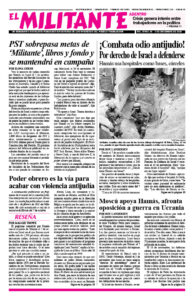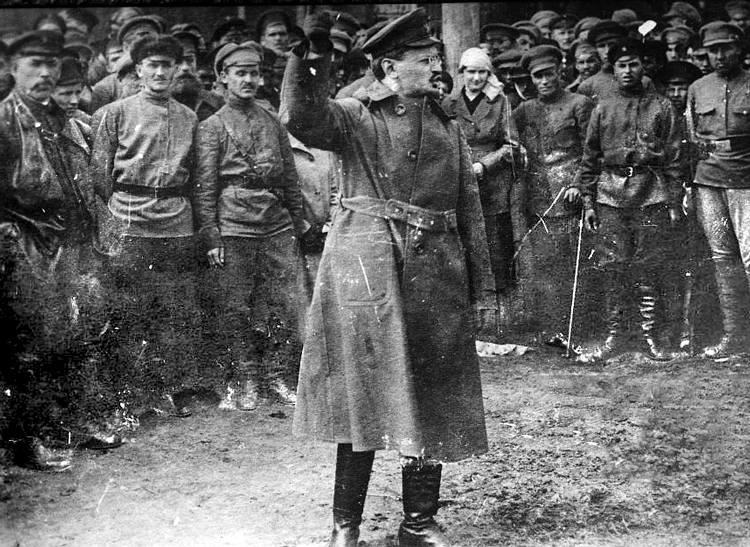Leon Trotsky Speaks is one of Pathfinder’s Books of the Month for November. The excerpt is from “The Organization of Power,” Trotsky’s Oct. 26, 1917, defense of the Bolshevik Revolution, which he helped lead. The Second Congress of the Soviets, the councils of workers, peasants and soldiers that took the power, that day elected a Bolshevik majority in a new government led by V.I. Lenin. Declaring for peace, it pulled Russia out of the first imperialist world slaughter, decreed land to the peasants, proclaimed the right to self-determination for Russia’s oppressed nationalities and set out on the world’s first socialist revolution. Trotsky fought to continue that proletarian internationalist course after Lenin’s death against a rising bureaucratic counterrevolution led by Joseph Stalin. Copyright © 1972 by Pathfinder Press. Reprinted by permission.
A few days ago when the question of an insurrection was openly raised, we were told we were isolating ourselves, we were heading for destruction, and in fact, if one were to judge from the political press what the class groupings were, then an insurrection threatened us with inevitable ruin.
Against us were counterrevolutionary bands and defensists of all varieties. One wing of the Left SRs worked courageously with us in the Military Revolutionary Committee. The rest of them took up a position of watchful neutrality. Nevertheless, even under these unfavorable conditions, when it seemed we were abandoned by everybody, the insurrection triumphed, almost without bloodshed.
If we had really been isolated, if the real forces had genuinely been against us, how could it have come about that we gained a victory almost without bloodshed? No, it was not we who were isolated, but the government and the democrats — the pseudodemocrats. It was they who were isolated from the masses. By their wavering, their compromising, they cut themselves off from the ranks of the real democracy.
Our great advantage as a party lies in the fact that we have formed a coalition with the masses, creating a coalition of the workers, soldiers, and poorest peasants.
Political groupings disappear, but the basic interests of classes remain. The party which prevails is the one that is able to understand and to satisfy the basic demands of classes. If a coalition was necessary then that coalition is the coalition of our garrison, chiefly composed of peasants, with the working class. We can be proud of such a coalition. This coalition has been tested in the fire of struggle. The Petrograd garrison and proletariat, as one, entered into the great struggle which will be the classic example of revolution in the history of all peoples. …
They say that the split in the democracy is a misunderstanding. When Kerensky sends shock troops against us, when they deal us blow after blow, can one really talk of a misunderstanding? …
We must choose between the different elements of the peasantry. Today, and right here, a representative of the peasants of Tver province demanded the arrest of Avksentiev. We must choose between the Tver peasant who demands the arrest of Avksentiev, and Avksentiev who has filled the prisons with members of the peasant committees. We are with the Tver peasants against Avksentiev. We are with them to the end and indissolubly. We firmly reject coalition with the kulak elements of the peasantry in the name of coalition of the working class and the poorest peasants.
If the revolution has taught us anything then it is this — that it is only by way of agreement, by way of a genuine coalition of these elements that victory can be achieved. Those who chase the shadow of coalition are isolating themselves from life. The Left SRs will lose support among the masses to the extent that they venture to oppose themselves to our party; a party which opposes itself to the party of the proletariat, with whom the village poor have united, isolates itself from the revolution.
Openly and in front of the whole people we raised the banner of insurrection. The political formula of this insurrection was: All power to the Soviets — through the Congress of Soviets. We are told: You did not wait for the congress. No, we would have waited for it but Kerensky did not want to wait; the counterrevolutionaries were not sleeping. We as a party considered it our task to create a real chance for the Congress of Soviets to take power into its hands. If the congress had been surrounded by junkers how could it have taken the power into its hands? To achieve this task, what was needed was a party which would wrest the power from the hands of the counterrevolutionaries and say to you: “Here is the power and you are obliged to take it!” [Stormy, continuous applause.] …
For a successful struggle for peace, said Comrade Avilov, we must have a coalition with the Compromisers. At the same time he said that the Allies do not want to conclude peace; but if we rally to those who are betraying us everything will be fine. The Allied imperialists laughed, says Avilov, at the margarine democrat Skobelev. But nevertheless he advised us: If you form a bloc with the margarine democrats, the cause of peace will be assured!
There are two ways in the struggle for peace. One way is to oppose to the Allied and enemy governments the moral and material forces of the revolution. The other way is a bloc with Skobelev, which means a bloc with Tereshchenko, that is, complete submission to Allied imperialism.
It is pointed out to us that in our proclamation on peace we address ourselves at the same time to the governments and the peoples. This is only a formal equality.
We of course are not thinking of influencing the imperialist governments with our proclamations; but as long as they exist we cannot ignore them. But we rest all our hope on the unleashing of the European revolution by our revolution. If the insurrectionary peoples of Europe do not crush imperialism, we will be crushed — that is beyond doubt. Either the Russian Revolution will raise the whirlwind of struggle in the West or the capitalists of all countries will crush our revolution.


